英语八年级课件-反意疑问句的用法归纳
- 格式:docx
- 大小:43.02 KB
- 文档页数:13
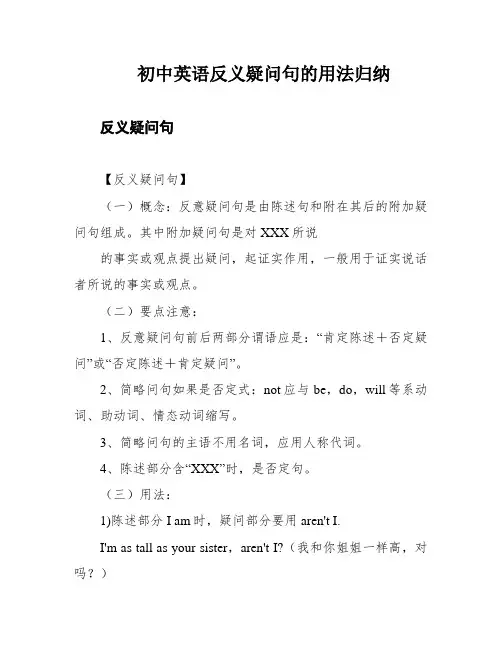
初中英语反义疑问句的用法归纳反义疑问句【反义疑问句】(一)概念:反意疑问句是由陈述句和附在其后的附加疑问句组成。
其中附加疑问句是对XXX所说的事实或观点提出疑问,起证实作用,一般用于证实说话者所说的事实或观点。
(二)要点注意:1、反意疑问句前后两部分谓语应是:“肯定陈述+否定疑问”或“否定陈述+肯定疑问”。
2、简略问句如果是否定式:not应与be,do,will等系动词、助动词、情态动词缩写。
3、简略问句的主语不用名词,应用人称代词。
4、陈述部分含“XXX”时,是否定句。
(三)用法:1)陈述部分I am时,疑问部分要用aren't I.I'm as tall as your sister,aren't I?(我和你姐姐一样高,对吗?)2)XXX说局部用no, nothing, nobody, never, few, little, seldom, hardly等否认寄义的词时,疑问局部用肯定含义。
如:The old man made no answer, did he?Jim is never late for school, is he?3)XXX说局部有神态动词have to+v. (had to + v.),疑问局部经常使用don't +主语(didn't +主语)。
We have to get there at eight tomorrow, don't we?used to,疑问局部用didn't +主语或usedn't +主语。
He used to take pictures there, didn't he? / usedn't he?had better(最好)+ v.疑问句部分用hadn't you?You'd better read it by yourself, hadn't you?4)陈说局部有would rather(宁肯、宁肯)+v.,疑问局部多用XXX主语。
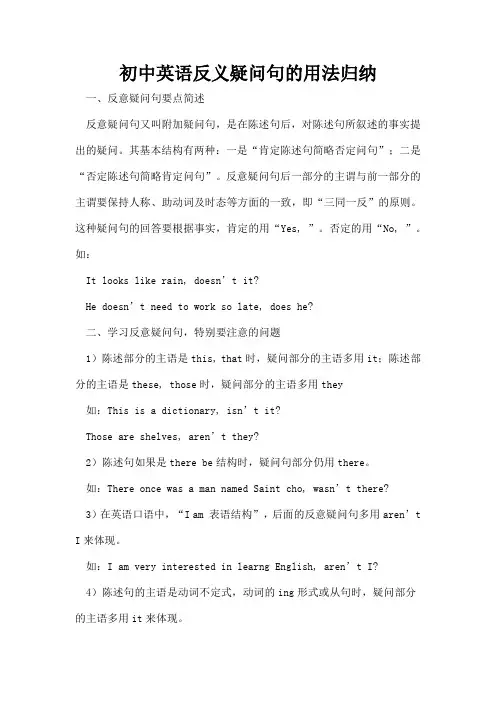
初中英语反义疑问句的用法归纳一、反意疑问句要点简述反意疑问句又叫附加疑问句,是在陈述句后,对陈述句所叙述的事实提出的疑问。
其基本结构有两种:一是“肯定陈述句简略否定问句”;二是“否定陈述句简略肯定问句”。
反意疑问句后一部分的主谓与前一部分的主谓要保持人称、助动词及时态等方面的一致,即“三同一反”的原则。
这种疑问句的回答要根据事实,肯定的用“Yes, ”。
否定的用“No, ”。
如:It looks like rain, doesn’t it?He doesn’t need to wor k so late, does he?二、学习反意疑问句,特别要注意的问题1)陈述部分的主语是this, that时,疑问部分的主语多用it;陈述部分的主语是these, those时,疑问部分的主语多用they如:This is a dictionary, isn’t it?Those are shelves, aren’t they?2)陈述句如果是there be结构时,疑问句部分仍用there。
如:There once was a man named Saint cho, wasn’t there?3)在英语口语中,“I am 表语结构”,后面的反意疑问句多用aren’t I来体现。
如:I am very interested in learng English, aren’t I?4)陈述句的主语是动词不定式,动词的ing形式或从句时,疑问部分的主语多用it来体现。
如:Taking care of our environment is very imrtant, isn’t it? What he said is right, isn’t it?5)陈述句中含有not, no, hardly, neither, never, few, little, too to等否定词或具有否定意义的词时,疑问部分常用肯定形式。
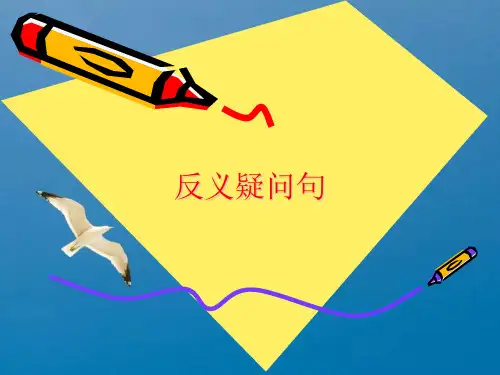
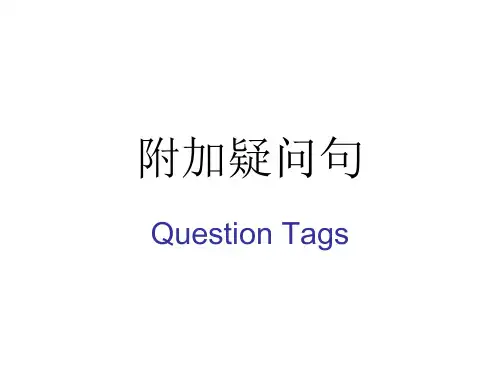
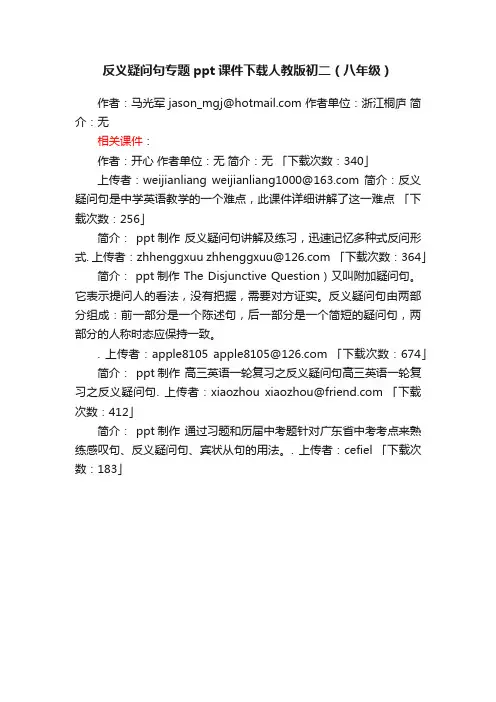
反义疑问句专题ppt课件下载人教版初二(八年级)
作者:马光军*********************作者单位:浙江桐庐简介:无
相关课件:
作者:开心作者单位:无简介:无「下载次数:340」
上传者:weijianliang ************************简介:反义疑问句是中学英语教学的一个难点,此课件详细讲解了这一难点「下载次数:256」
简介:ppt制作反义疑问句讲解及练习,迅速记忆多种式反问形式. 上传者:****************************「下载次数:364」简介: ppt制作 The Disjunctive Question)又叫附加疑问句。
它表示提问人的看法,没有把握,需要对方证实。
反义疑问句由两部分组成:前一部分是一个陈述句,后一部分是一个简短的疑问句,两部分的人称时态应保持一致。
. 上传者:apple8105 *****************「下载次数:674」简介:ppt制作高三英语一轮复习之反义疑问句高三英语一轮复习之反义疑问句. 上传者:xiaozhou *******************「下载次数:412」
简介:ppt制作通过习题和历届中考题针对广东省中考考点来熟练感叹句、反义疑问句、宾状从句的用法。
. 上传者:cefiel 「下载次数:183」。
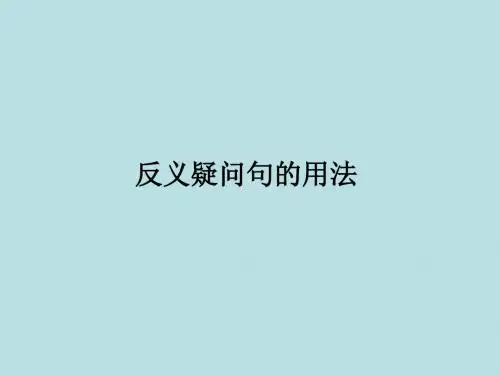
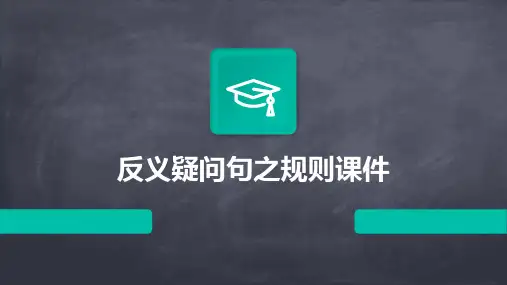
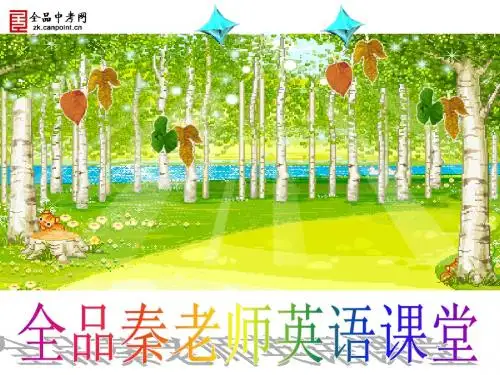

初中英语反义疑问句用法归纳-CAL-FENGHAI.-(YICAI)-Company One1反义疑问句一、反意疑问句要点简述反意疑问句又叫附加疑问句,是在陈述句后,对陈述句所叙述的事实提出的疑问。
其基本结构有两种:一是“肯定陈述句+简略否定问句”;二是“否定陈述句+简略肯定问句”。
反意疑问句后一部分的主谓与前一部分的主谓要保持人称、助动词及时态等方面的一致,即“三同一反”的原则。
这种疑问句的回答要根据事实,肯定的用“Yes, …”。
否定的用“No, …”。
如:It looks like rain, doesn’t it?He doesn’t need to work so late, does he?二、学习反意疑问句,特别要注意的问题1)陈述部分的主语是this, that时,疑问部分的主语多用it;陈述部分的主语是these, those时,疑问部分的主语多用they如:This is a dictionary, isn’t it?Those are shelves, aren’t they?2)陈述句如果是there be结构时,疑问句部分仍用there。
如: There once was a man named Saint Nicholas, wasn’t there?3)在英语口语中,“I am +表语结构”,后面的反意疑问句多用aren’t I来体现。
如: I am very interested in learning English, aren’t I?4)陈述句的主语是动词不定式,动词的-ing形式或从句时,疑问部分的主语多用it来体现。
如: Taking care of our environment is very important, isn’t it?What he said is right, isn’t it?5)陈述句中含有not, no, hardly, neither, never, few, little, too …to等否定词或具有否定意义的词时,疑问部分常用肯定形式。
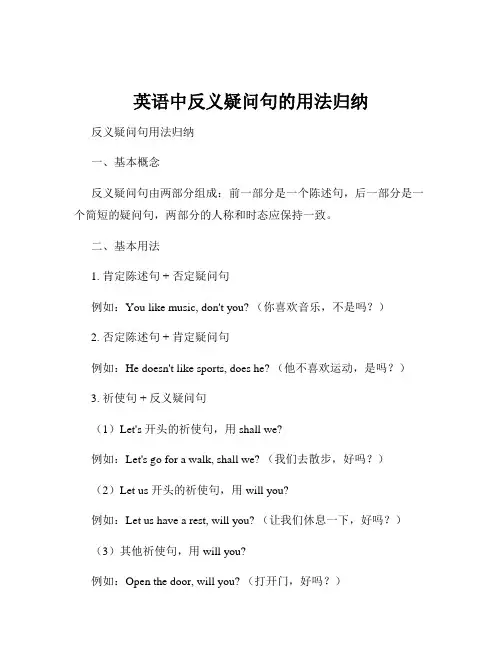
英语中反义疑问句的用法归纳反义疑问句用法归纳一、基本概念反义疑问句由两部分组成:前一部分是一个陈述句,后一部分是一个简短的疑问句,两部分的人称和时态应保持一致。
二、基本用法1. 肯定陈述句 + 否定疑问句例如:You like music, don't you? (你喜欢音乐,不是吗?)2. 否定陈述句 + 肯定疑问句例如:He doesn't like sports, does he? (他不喜欢运动,是吗?)3. 祈使句 + 反义疑问句(1)Let's 开头的祈使句,用 shall we?例如:Let's go for a walk, shall we? (我们去散步,好吗?)(2)Let us 开头的祈使句,用 will you?例如:Let us have a rest, will you? (让我们休息一下,好吗?)(3)其他祈使句,用 will you?例如:Open the door, will you? (打开门,好吗?)4. 含有 must 的反义疑问句(1)must 表示“必须”时,用 needn't例如:You must finish your homework today, needn't you? (你今天必须完成作业,不是吗?)(2)must 表示推测“一定,肯定”时,根据实际情况而定例如:He must be very tired, isn't he? (他一定很累了,不是吗?)5. 含有否定词的反义疑问句当陈述句中有 never, few, little, nothing, nobody 等否定词时,反义疑问句用肯定形式。
例如:There is nothing in the box, is there? (盒子里什么都没有,是吗?)三、固定搭配1. “I am + 表语”,反义疑问句用“aren't I”例如:I'm late, aren't I? (我迟到了,不是吗?)2. 陈述部分是“there be”结构,反义疑问句用“be there”例如:There is a book on the desk, isn't there? (桌子上有一本书,不是吗?)3. 当陈述部分主语是不定代词 everyone, somebody, nobody, everyone 等时,反义疑问句用 they 或 he例如:Everyone is here, aren't they? (大家都在这儿,不是吗?)4. 当陈述部分主语是 this, that 时,反义疑问句用 it;当陈述部分主语是 these, those 时,反义疑问句用 they例如:This is a pen, isn't it? (这是一支钢笔,不是吗?)5. 当陈述部分是主从复合句时,反义疑问句与主句的主语和谓语保持一致例如:He said he would come, didn't he? (他说他会来,不是吗?)双语例句:1. I have a lot of friends, don't I? (我有很多朋友,不是吗?)2. She doesn't speak French, does she? (她不会说法语,是吗?)3. Have a cup of coffee, will you? (喝杯咖啡,好吗?)4. We should study hard, shouldn't we? (我们应该努力学习,不是吗?)5. They have been to Beijing, haven't they? (他们去过北京,不是吗?)6. You aren't a doctor, are you? (你不是医生,对吧?)7. There are some apples on the tree, aren't there? (树上有一些苹果,不是吗?)8. Nobody knows the answer, do they? (没人知道答案,对吧?)9. This isn't your book, is it? (这不是你的书,对吧?)10. Those are beautiful flowers, aren't they? (那些是漂亮的花,不是吗?)11. He can swim very well, can't he? (他游泳游得很好,不是吗?)12. She never tells lies, does she? (她从不说谎,对吧?)13. We had a great time yesterday, didn't we? (我们昨天玩得很开心,不是吗?)14. If it rains tomorrow, we won't go hiking, will we? (如果明天下雨,我们就不去徒步了,对吧?)15. You think he is right, don't you? (你认为他是对的,不是吗?)16. Mary has few friends here, does she? (玛丽在这儿几乎没朋友,对吧?)17. The boy doesn't like vegetables, does he? (这男孩不喜欢蔬菜,是吗?)18. Everyone wants to be happy, don't they? (每个人都想快乐,不是吗?)19. I'm a good student, aren't I? (我是个好学生,不是吗?)20. He told you the truth, didn't he? (他告诉你真相了,不是吗?)。
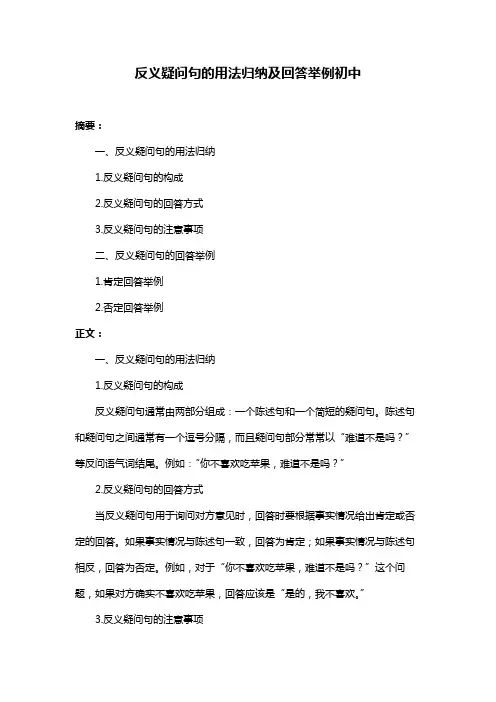
反义疑问句的用法归纳及回答举例初中
摘要:
一、反义疑问句的用法归纳
1.反义疑问句的构成
2.反义疑问句的回答方式
3.反义疑问句的注意事项
二、反义疑问句的回答举例
1.肯定回答举例
2.否定回答举例
正文:
一、反义疑问句的用法归纳
1.反义疑问句的构成
反义疑问句通常由两部分组成:一个陈述句和一个简短的疑问句。
陈述句和疑问句之间通常有一个逗号分隔,而且疑问句部分常常以“难道不是吗?”等反问语气词结尾。
例如:“你不喜欢吃苹果,难道不是吗?”
2.反义疑问句的回答方式
当反义疑问句用于询问对方意见时,回答时要根据事实情况给出肯定或否定的回答。
如果事实情况与陈述句一致,回答为肯定;如果事实情况与陈述句相反,回答为否定。
例如,对于“你不喜欢吃苹果,难道不是吗?”这个问题,如果对方确实不喜欢吃苹果,回答应该是“是的,我不喜欢。
”
3.反义疑问句的注意事项
在使用反义疑问句时,要注意陈述句和疑问句的一致性。
如果陈述句是肯定形式,疑问句部分也应该是肯定形式;如果陈述句是否定形式,疑问句部分也应该是否定形式。
此外,反义疑问句通常用于表示对某事不确定或想要得到对方确认的情况下,所以要根据实际情况适当使用。
二、反义疑问句的回答举例
1.肯定回答举例
张三问:“你不喜欢吃苹果,难道不是吗?”
李四回答:“是的,我不喜欢。
”
2.否定回答举例
张三问:“你不喜欢吃苹果,难道不是吗?”
李四回答:“不,我喜欢吃苹果。
反意疑问句:由两部分构成,前一部分是对事物的陈述(即陈述句),后一部分是简短的提问(即省略的一般疑问句)。
1. 前部分肯定,后部分否定。
2. 前部分否定,后部分肯定。
陈述句疑问句尾is /was are/were There be can will have 表示“有”或在 has 完 成 时 中 当 助 had 动词 have 表示“有 ”或 has 当实义动词 hadisn't/ wasn't aren't /weren't be there can't won't haven't hasn't hadn't don't doesn't didn'tHe is/ was a student, isn't /wasn't he? They are/ were here, aren't /weren't they? There is a book on the desk, isn't there? He can speak English, can't he? They will wait for you, won't they? They have a room, haven't they? He hasn't cleaned his room, hasn't he? You had a dog last year, hadn't you? They have a class meeting , don't they? He has breakfast at home, doesn't he? The girl had a good time, didn't she?have /has /had todon't/doesn't/didn'tYou have to stay at home, don't you?had better 行为动词的 一般现在时 一般过去时No,not,nothing,never, hardly,few,little,seldom 祈使句let us let's 含有 un-,in,im,il,ir,dis 否 定前缀或否定后缀 less 构成的派生词 must be 表推测 must 表必须 mustn't 表禁止 can't 表推测hadn't/shouldn't don't doesn't didn't 用肯定形式will/won't/would you will/won't you shall we 用否定形式aren't/isn't+主语 needn't must 跟 can't 后的动词一致We'd better go now, hadn't/shouldn't we? They like playing football, don't they? He likes music, doesn't he? The woman bought a book, didn't she? He has hardly done his homework, has he? Please turn it on, will/won't/would you? Let us help him, will/won't you Let's have a rest, shall we? She dislikes it, doesn't she? You are unhappy, aren't you? You are hopeless, aren't you? He must be happy, isn't he ? You must do it today, needn't you? You mustn't talk like that, must you? He can't be a doctor, is he?I am 主从复合句 I think/believe/guess/ suppose+宾语从句并列句 used toaren't /ain't I; am I not I am your friend, aren't I一般跟主句一致He said she had been there, didn't he?动词和主语跟从句一 I think he'll come to help us, won't he? 致,用肯定还是否定 I don't think he is clever, is he? 根据主句来确定与邻近的分句一致 Mary is here, but she was here just now, wasn't she?usedn't/didn'tHe used to be a teacher, usedn't/didn't he?陈述句主语 this, that These, those one something, anything everything, nothing everybody, everyone somebody, someone anybody, anyone nobody, no one,none either, neither each of some(none) of疑问句尾主语 it theyone, he itthey ,he例句 This is your brother, isn't it? These are not books, are they? One can't be always young, can one/he? Nothing is serious, is it? Everything seems all right, doesn't it? Everyone knows this, don't they/doesn't he? Nobody likes to lose money, does he? No one came , did they?they ,he It 或 they ,youEach of the boys had an apple, didn't he /they? None of the food was delicious, was it? Some of the men **e back, haven't they?or, and , neither…nor, either…or, both…and not only… but also not...but 等连接的并 列主语 不定式,动名词,从 句或词组 the+ 形 容 词 表 示 一 类人 there 引起的句子复数代词it 复数代词 there一、 选择填空** is a driver,_____?A. does he B. doesn't heC. is he D. isn't he** have a sports meeting every year,___?A. have youB. do youC. haven't you D. don't you3. He has never watched such an importantmatch , _____ he?A. hasn't B. has C. is D. isn'tA. ** have to work at once,______ they?have B. haven't C. do D. don't5. She often feels tired,______ she?Neither you nor I am wrong, are we? Both Tom and Jack came, didn't they?To learn English well isn't easy, is it? Swimming is great fun, isn't it? The poor had no right to speak at that time, did they? There stands a house and a lot of trees, doesn't they?A. doesn't B. does C. is D. isn't 6.--That's wrong, isn't it? -- ______A. Yes, it is. B. Yes, it isn't.C. No, it is. D. Yes, it was. 7. Let's take a short rest, ______?A. do we B. aren't we C. will you D. shall we 8. Five-year-old children are too young to go to school, ________ they? A. are B. aren't C. were D. have 9. Hundreds of people lost their lives in the accident,_______ they?A. don't B. didn't C. do D. did** isn't any bread on the table, ______?A. isn't there B. is thereC. has there D. is it11. Mr King can not speak Chinese,____ he?A.doesn't B. does C. can't D. can12. Lily didn't come to school, did she?____. She was ill in bed.** ,she did B. Yes , she did.C. No ,she didn't. D. Yes ,she didn't13.--She isn't a teacher, is she?--_____. She works in a hospital.A.No ,she is B. Yes , she is.C. No ,she isn't. D. Yes ,she isn't** looks like Lucy,_______?A. is LilyB. isn't sheC. does Lilly D. doesn't she** often has lunch at school,_____?A. doesn't TomB. doesn't heC. does TomD. doesn't he16. Your family has no colour TV___it?A. hasn't B. doesn't C.is D. has** could hardly believe what he hadsaid, _____ you?A. could B. couldn't C. can D. were18. --You don't smoke, do you?--______.A. Yes, I don't B. No, I doC. No, I don't D. Yes, I am.二、完成下列反意疑问句.** are late, ________ __________?** is on time,_________ _________?** were in the classroom just now,_________________?** was ten years old last year_________________?5. They are going hiking next Sunday ,________ _________?** cat is running up the tree.** is going to help me with my English8 There is some water in the bottle,_________ __________? ** are many soldiers over there, _______ __________? ** can skate, __________ ___________? ** parents can play chess,_____ ______? 12. They will work on the farm,________ _________? 13. My parents will visit my grandparents next Monday,________ _________? 14. They have written nine books since 1995, ________ _________? 15, The woman has already found her son. , ________ _________? 16. They have three balls,_______ ______? 17. Jack has two sister,________ _______? ** have six classes every day,________ _________? ** has lunch at home,_____ _________? ** students had a good time last Sunday,___________ ____________? 21. We have to finish it,______ ________? 22. The workers had to take the first bus, ________ _________? 23. You had better stay at home today, _________ __________? ** clean our classroom every day,________ _________? 25. He watches TV on Saturday evening, ________ _________? 26. The boys often play football on the playground,________ _________? ** singers went to H.K yesterday,________ _________? ** studied hard last year,________ _________? ** planted many trees last month,________ _________? ** pen is yours,_________ __________? ** was a wonderful film,______ _____?** is ready, ________ ________? ** is nothing wrong with the radio,___ ** did little homework yesterday, _______ __________? **'d like some coffee,______ ______? **'s have a rest, _______ ____________? ** us read the text, ________ ________? **'t read in bed, _________ _________? 39. Stop laughing,_______ __________? 40. He has to go there at eight,______ _____? ** has never been to Beijing, _____ ____? ** can hardly speak,_______ ________? ** people know her here______ _____? ** mother was unhappy when she heard the news, _____ _______? ** dislikes watching football match____ ______? ** used to swim in the river,____ _____? ** think your brother is right, ____ ______? 48. I don't think he will go there,____ _____?选择疑问句选择疑问句说话人对问题提出两个或两 个以上的选项,让对方选择回答。